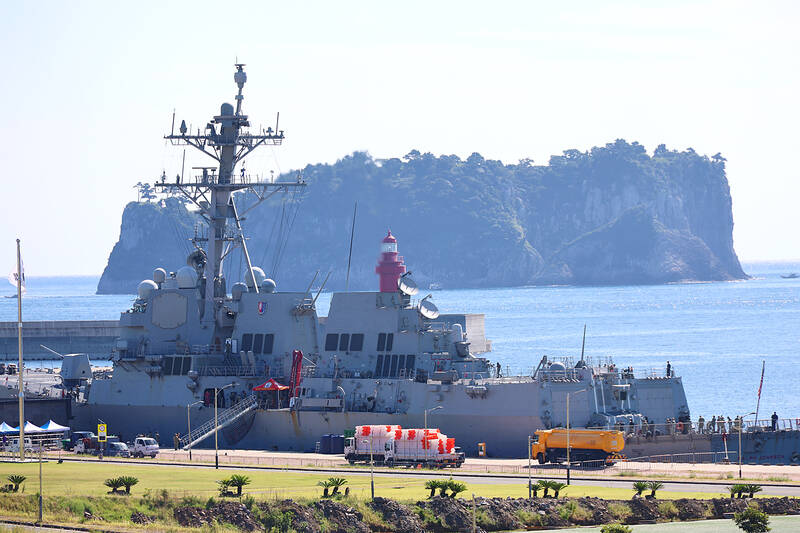Two US military vessels transited the Taiwan Strait from Sunday through early yesterday, the Ministry of National Defense said in a statement, the first such mission since US President Donald Trump took office last month.
The two vessels sailed south through the Strait, the ministry said, adding that it closely monitored nearby airspace and waters at the time and observed nothing unusual.
The ministry did not name the two vessels, but the US Navy identified them as the Arleigh Burke-class guided-missile destroyer USS Ralph Johnson and the Pathfinder-class survey ship USNS Bowditch.

Photo: EPA-EFE
The ships carried out a north-to-south transit from Monday to yesterday, a US military spokesperson said.
“The transit occurred through a corridor in the Taiwan Strait that is beyond any coastal state’s territorial seas,” said US Navy Commander Matthew Comer, a spokesperson at the US military’s Indo-Pacific Command.
“Within this corridor all nations enjoy high-seas freedom of navigation, overflight and other internationally lawful uses of the sea related to these freedoms,” Comer said.
The US 7th Fleet did not publicize the passage in a news release, as was standard during the previous administration of former US president Joe Biden.
The confirmations made by the US and Taiwanese militaries came after China made a statement regarding the transit earlier yesterday.
The Chinese state-run Global Times quoted Chinese People’s Liberation Army (PLA) Eastern Theater Command spokesman Li Xi (李熹) as saying that Chinese forces have “deployed naval and air forces to monitor the entire passage of the US vessels, effectively responding to and managing the situation.”
“The actions of the US sent the wrong signals and increased security risks. The Eastern Theater Command remains on high alert, resolutely safeguarding national sovereignty and security, as well as regional peace and stability,” Li said.
China’s Taiwan Affairs Office spokeswoman Zhu Fenglian (朱鳳蓮) in Beijing said that Taiwan was a “core interest” for the country and that the US should act with caution.
“We are resolutely opposed to this and will never allow any outside interference, and have the firm will, full confidence and capability to uphold the country’s sovereignty and territorial integrity,” she said.
“I really do not need to explain further who is the so-called troublemaker around the Taiwan Strait. All other countries in the neighborhood have a deep appreciation of this,” ministry spokesman Sun Li-fang (孫立方) told reporters in Taipei.
The US Navy, sometimes joined by allies, makes regular transits through the Taiwan Strait in what it calls exercising freedom of navigation rights.
The last time a US warship transited the Strait was on Oct. 20 last year.
It was an Arleigh Burke-class guided-missile destroyer USS Higgins, along with a Royal Canadian Navy Halifax-class frigate HMCS Vancouver.
Chinese state television yesterday said that since Lunar New Year’s Eve on Jan. 28, the PLA’s Eastern Theater Command had repeatedly dispatched sea and air forces to carry out “combat readiness” patrols and training missions around Taiwan.
The operations aim to “guard the joy and peace of the people on both sides of the Taiwan Strait,” the report said.

Seventy percent of middle and elementary schools now conduct English classes entirely in English, the Ministry of Education said, as it encourages schools nationwide to adopt this practice Minister of Education (MOE) Cheng Ying-yao (鄭英耀) is scheduled to present a report on the government’s bilingual education policy to the Legislative Yuan’s Education and Culture Committee today. The report would outline strategies aimed at expanding access to education, reducing regional disparities and improving talent cultivation. Implementation of bilingual education policies has varied across local governments, occasionally drawing public criticism. For example, some schools have required teachers of non-English subjects to pass English proficiency

‘FORM OF PROTEST’: The German Institute Taipei said it was ‘shocked’ to see Nazi symbolism used in connection with political aims as it condemned the incident Sung Chien-liang (宋建樑), who led efforts to recall Democratic Progressive Party (DPP) Legislator Lee Kun-cheng (李坤城), was released on bail of NT$80,000 yesterday amid an outcry over a Nazi armband he wore to questioning the night before. Sung arrived at the New Taipei City District Prosecutors’ Office for questioning in a recall petition forgery case on Tuesday night wearing a red armband bearing a swastika, carrying a copy of Adolf Hitler’s Mein Kampf and giving a Nazi salute. Sung left the building at 1:15am without the armband and apparently covering the book with a coat. This is a serious international scandal and Chinese

PERSONAL DATA: The implicated KMT members allegedly compiled their petitions by copying names from party lists without the consent of the people concerned Judicial authorities searched six locations yesterday and questioned six people, including one elderly Chinese Nationalist Party (KMT) member and five KMT Youth League associates, about alleged signature forgery and fraud relating to their recall efforts against two Democratic Progressive Party (DPP) legislators. After launching a probe into alleged signature forgery and related fraud in the KMT’s recall effort, prosecutors received a number of complaints, including about one petition that had 1,748 signatures of voters whose family members said they had already passed away, and also voters who said they did not approve the use of their name, Taipei Deputy Chief Prosecutor

TRADE: The premier pledged safeguards on ‘Made in Taiwan’ labeling, anti-dumping measures and stricter export controls to strengthen its position in trade talks Products labeled “made in Taiwan” must be genuinely made in Taiwan, Premier Cho Jung-tai (卓榮泰) said yesterday, vowing to enforce strict safeguards against “origin laundering” and initiate anti-dumping investigations to prevent China dumping its products in Taiwan. Cho made the remarks in a discussion session with representatives from industries in Kaohsiung. In response to the US government’s recent announcement of “reciprocal” tariffs on its trading partners, President William Lai (賴清德) and Cho last week began a series of consultations with industry leaders nationwide to gather feedback and address concerns. Taiwanese and US officials held a videoconference on Friday evening to discuss the